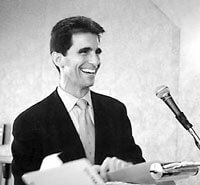Sacramento judge rejects claim that domestic partnership is gay marriage
A Superior Court judge in Sacramento rejected an attempt by anti-gay forces to block California’s wide-ranging domestic partnership law from going into effect on January 1.
Ruling on motions brought by the Proposition 22 Legal Defense and Education Fund, Judge Loren E. McMaster held on September 8 that the statute is not blocked by the passage two years ago of Proposition 22, a voter referendum that established a California law banning same-sex marriages in the state.
The Prop 22 plaintiffs, which included the Campaign for California Families and the Alliance Defense Fund (ADF) (and, before his death, state Sen. Pete Knight, a Republican who led the referendum effort), charged that the domestic partnership law, in creating a legal status for same-sex couples very close to marriage, was an end-run by the legislature. Under California law, a statute is enacted by popular initiative cannot be changed or overridden by simple legislation.
In court, ADF attorney Robert Tyler argued that, “The law is a sneak end-run around the will of the people.”
The controversial domestic partnership measure, signed into law last fall by Gov. Gray Davis shortly before he yielded office to Arnold Schwarzenegger as a result of a recall vote, clearly builds on prior bills passed during his administration that widened the scope of state benefits and obligations for same-sex couples who register as partners. It did not accord the equivalence of legal marriage, falling slightly short of the more extensive coverage exemplified by Vermont’s Civil Union Act.
The judge, Loren E. McMaster, held that marriage and domestic partnership rights are different and that the statute does not violate Proposition 22.
“Although the two relationships share many, if not most, of the same functional attributes, they are inherently distinct,” McMaster stated. “And, despite the plaintiffs’ arguments to the contrary, the least important of the distinctions between the two relationships is not the name given to the union.”
The plaintiffs argued that withholding the word “marriage” from these relationships was merely cosmetic, because for most practical purposes of California law, registered same-sex partners would be treated the same as if they are married. But marriage is not just about the concrete benefits attached to it, McMaster wrote: “The word marriage imports much more than its entitlements as necessarily conceded by plaintiff at oral argument. Marriage has been the keystone of civilized society, predating governmental regulation. It has been in society’s interest to maintain the institution of marriage for a broad spectrum of contemporary societal goals ranging from certainty in property rights to procreation…. The title of marriage is much more than just a word, and it is this very special title that was preserved by Proposition 22.”
McMaster carefully stated that he was expressing “no view on the constitutionality of a law that limits marriage to a man and a woman,” since it was not necessary for him to do so in this case. But he pointed out that Prop 22, by its terms, had nothing at all to say about domestic partnerships. Indeed, in 1999, the year before Prop 22 was on the ballot, the Legislature passed the first, limited version of a domestic partnership law. Despite this, the drafters of Prop 22 did not see fit to propose that their measure outlaw domestic partnerships, although they clearly could have done so.
McMaster pointed out that in the same year that Prop 22 was on the California ballot, voters in Nebraska approved a more wide-ranging proposition, amending their constitution to ban domestic partnerships and civil unions as well as same-sex marriages, so the concept of doing so was not unknown.
McMaster also noted that the domestic partnership statute is worded in crucial ways reflecting the Legislature’s understanding that domestic partners would not be considered married, such as instructions that domestic partners designate themselves as “single” on federal and state tax returns.
For his trouble in producing this opinion, McMaster has been targeted with a judicial recall by the Prop 22 Fund, as allowed by state law. Randy Thomasson of Campaign for California Families announced the recall effort.
The domestic partner law was defended by the state, with amicus briefs filed by the National Center for Lesbian Rights, the American Civil Liberties Union and Equality California, the state’s gay rights lobby. Equality California leader Geoff Kors called the ruling a “victory,” but said he hopes the Legislature will pass a marriage bill in its next session.
Mark Leno, a gay Democratic assemblymember from San Francisco, vowed to re-introduce a gay marriage bill in California when the new legislative season starts in January. He withdrew it this year, an election year, after it became clear he didn’t have adequate support in the Assembly. But next year, one of his co-sponsors will be the Assembly speaker, Fabian Núñez (D-Los Angeles), who has pledged to put the full weight of the California Democratic Party behind it.
Last month, the state’s Supreme Court nullified the 4,00 marriages performed in San Francisco, finding that Mayor Gavin Newsom had exceeded his powers in authorizing them. But the court did not rule on the constitutional issues regarding the state’s marriage laws. Judicial challenges on that issue are wending their way through the state’s courts and are expected to reach the California Supreme Court late next year.
Joe Dignan contributed reporting on this story.


































